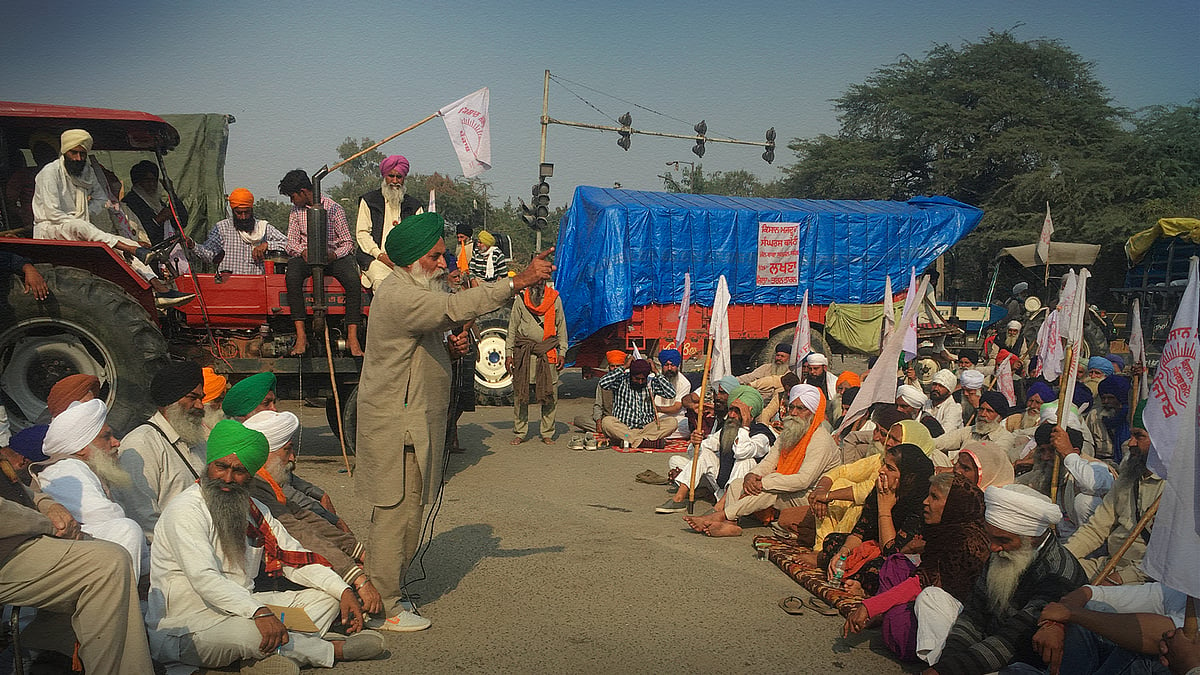Murder convict to farmer protests leader: How people power propels Manjit Singh Dhaner
The Punjabi farmer-activist was twice pardoned under public pressure.
Not long ago, farmer-activist Manjit Singh Dhaner, 64, was sentenced to life imprisonment in a murder case. Today, he is a free man, leading the farmer protests from pillar 805 at Tikri on Delhi’s border.
Dhaner, senior vice president of the farmer association Bharti Kisan Union Ekta Dakaunda, was twice pardoned in spite of the Supreme Court upholding his sentence.
For 47 days starting in September 2019, over 3,000 people sat outside the Barnala jail, where Dhaner was lodged, during the day, and about 500 of them slept in tents at night. They were served langar, rain or shine. The protest, mobilised by 42 farmer unions under the umbrella of Sangharsh Committee for Manjit Dhaner, forced Punjab’s government to accede to their demand to pardon the leader, not once but twice.
For Dhaner, the ongoing farmer protests are a reminder of the protests that rocked the Malwa region of Punjab for his release. “However this time, the fight is harsher and longer. In 2019 we were fighting the Punjab government, now we are fighting the Centre and capitalists. But we are prepared,” said a confident Dhaner, donning a green turban and scarf before leaving for the eight rounds of talks with the central government on January 8.
Behind bars
In the summer of 1997, a 16-year-old girl from Barnala’s Mehal Kalan area was abducted, gangraped and murdered by four men – Gurpreet Singh, Jagraj Singh Raju, Pratap, and Deshraj. Dhaner was a known activist in Mehal Kalan at that time. A marginal farmer with about 1.5 acres of land, he was block president of Bharti Kisan Union Sidhupur.
“Those men were bullies. They could influence police and politicians. On August 11 the dead body of our daughter was recovered from their house,” said Master Darshan Singh, the girl’s father, his voice stumbling, his hands shaking. “I didn’t even know Dhaner personally, but he stood by me, a handicapped teacher at a government school.”
Darshan had lost his arm while working in his fields when he was 17.
A few days after the girl’s murder, Dhaner formed the Mehal Kalan Action Committee to seek justice for “Punjab’s daughter”. It would prove instrumental in the August 2001 conviction of the four men, who were imprisoned for life by a sessions court.
“Dhaner organised multiple protests, distributed pamphlets, went to hearings with us,” Darshan recalled. At one such protest on March 2, 2001, a fight broke out between the protesters and the supporters of the accused at the sessions court hearing the matter. Dalip Singh, 82, who was related to the accused, was injured, and succumbed 10 days later. The police blamed for his death Dhaner and fellow Action Committee members Narain Dutt and Prem Kumar, the three men leading the protests.
“We were shocked. It was a false claim. This was not just an attack on our individual freedoms but also on our democratic right to protest. Police had implicated us because we were standing against the state,” said Dutt, who is retired from the Punjab State Electricity Board.
There was a public outcry when Dhaner, Narain Dutt and Prem Kumar were named in the FIR for Dalip Singh’s death. The state eventually moved to withdraw the case against them, but the sessions court refused to allow it and, on March 30, 2005, sentenced the three men to life in prison.
Public outcry
Outrage against Dhaner’s imprisonment snowballed in Punjab, where not only farmer unions, but teacher, student, and peasant associations came together to demand his release. They launched massive public protests, compelling the Punjab government to get the governor to pardon them in July 2007.
As per Article 161 of the constitution, the governor is empowered to grant pardons, reprieves, respites, or remissions of punishment or to suspend, remit or commute the sentence of any person convicted of any offence against any law.
“Those protests were not limited to the release of Dhaner. It was symbolic of a larger fight against the state,” said Dutt.
Jagmohan Singh Patiala, BKU Ekta Dakaunda’s general secretary, seconded Dutt. “Even the ongoing farmer protests aren’t just against the farm laws,” he argued, “they are symbolic of the larger fight against privatisation and capitalism.”
Pardon challenged
The pardon granted to Dhaner, Dutt and Kumar was challenged by Dalip Singh’s family before the Punjab and Haryana High Court, which set aside the governor’s order on March 11, 2008. On appeal, the court acquitted Dutt and Kumar but upheld Dhaner’s sentence. The matter then went to the Supreme Court.
On September 3, 2019, the Supreme Court dismissed his appeal and upheld the high court’s order. He was given four weeks to surrender before the court.
That’s when the massive sit-in demonstration began outside the Barnala jail. At its peak on September 30, over 20,000 people hit Barnala’s roads to demand Dhaner’s release.
On November 15, Punjab’s governor gave his consent for pardoning Dhaner again, making him the first person in Punjab to be pardoned twice. Thousands of activists, including a number of women wearing green and saffron dupattas, greeted Dhaner as he walked out of the Barnala jail, a free man.

Unions unite
“In the past, such unity was witnessed in the 1980s when BKU was the sole peasant organisation with a huge mass base,” said Kanwaljit Khanna, general secretary of Punjab Lok Sabhyacharak Manch, referring to the protests for Dhaner’s release. “BKU organised a sit-in protest in Chandigarh where all unions, big and small, came together. Their demands were loan waiver and subsidies, however it failed as a compromise was reached between the state government and Ajmer Singh Lakhowal, the leader of the protests.”
He continued, “After that the union split into fractions, Sidhupur, Kadyan, Rajewal, and Ugrahan, etc. I can only recall the protest of 2019 and 2020 where all unions came together. It is very rare.”
Dutt told Newslaundry, “In 2018, when Dhaner’s hearing in the Supreme Court was almost a year away, BKU Ekta Dakaunda united the representatives of more than three dozen organisations, including BKU Ekta Ugrahan, Punjab Kisan Union, Kirti Kisan Union, Kisan Sangharsh Committee Azad. Slowly and gradually representatives of more than two dozen other organisations of agricultural labourers, employees, students started joining us.”
Drawing parallels between the ongoing protests and the 2019 stir, he said, “There are always some differences when all unions come together but all of us agree on a common minimum point. In 2019, it was the pardon of Dhaner, now it is the rollback of the farm laws.”
Jagmohan Singh Patiala recalled, “At that time there was a split among unions regarding Dhaner’s pardon. The state government in a pardon granted to him in 2007 observed that he was not guilty. That was set aside by the high court. The pardon granted to him in 2019 observed that he was guilty but was recommended for pardon because of his social work. BKU Krantikari and Krantikari Kisan Union, Punjab were against declaring him guilty.”
He added, “Similarly, there are differences even now. BKU Ekta Ugrahan went ahead and asked for the release of political prisoners which did not sit well with other unions during the ongoing farmer protests. However, in the end, the protests for Dhaner’s release gave us a very important lesson: there is strength in unity. That is why all unions are together like a fist.”
Pictures by Srishti Jaswal.
 Explained: Why farmers don’t trust Modi government’s word on farm laws
Explained: Why farmers don’t trust Modi government’s word on farm laws A matter of trust: Why farmers want MSP written into law
A matter of trust: Why farmers want MSP written into law
